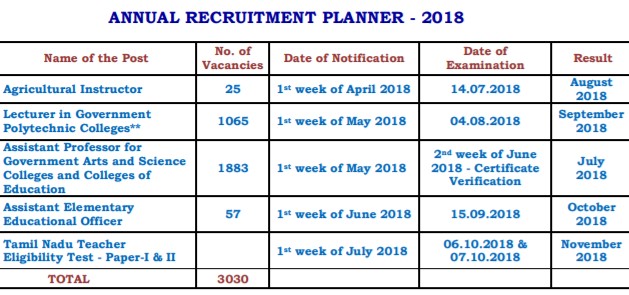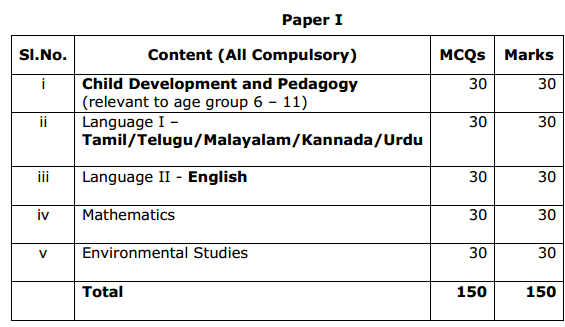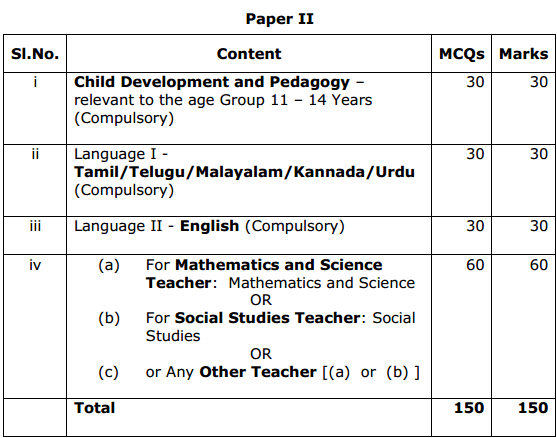TNTET Tamil Nadu Teachers Eligibility Test -TRB
TNTET Tamil Nadu Teachers Eligibility Test – For eligible teachers wanting to teach from classes 1 to 8,it is mandatory to take the TNTET set up by the Teachers recruitment board.. Teachers wanting to teach classes 1 to 5 have to take paper 1.Teachers wanting to teach classes 6 to 8 have to take paper 2.
For more information contact below:
Government of Tamil Nadu
TEACHERS RECRUITMENT BOARD
4th Floor, EVK Sampath Maaligai, DPI Campus, College Road, Chennai -600 006
HELP LINE
044 – 28272455, 7373008144, 7373008134
Contents
ANNUAL RECRUITMENT PLANNER – 2018

TNTET Tamil Nadu Teachers Eligibility Test Eligibility:
Candidates should have atleast 10+2/diploma.
Those already having a bachelors degree/B.ed or 10+2+3 can directly sit for paper 2
Syllabus for TNTET Tamil Nadu Teachers Eligibility Test -TRB
Teachers Eligibility Test – Paper 1
(i) Child Development and Pedagogy
(Relevant to Age Group 6 – 11)
Part (A): Child Development
Unit-I: The Children’s Profile at the Beginning of Primary
Education—Physical and Cognitive.
Trends in physical growth—Hormonal influences on physical growth—
Development of neurons Symbolic thinking and limits of logic—Sensory
motor stage-Pre operational stage-Language Development—Influence of
home environment, attitude of family members on cognitive development
of the child-Identity status and psychological well being.
Unit-II: The Children’s Profile at the Beginning of Primary
Education—Social and Emotional.
Self concept and Social Awareness—Sibling relationships—Peer
relationship and play—Self awareness—Cultural influence on self-conceptcorresponding
stages of Erickson’s Psycho-social development Emotional
development in a Social
Unit-IV: Social and Emotional Development during Primary School
Years (6 to 10 Years)
Meaning of social development-social expectations-Children’s Friendshipsfactors
in friendship and choices of companions social acceptance-the
desire to belong-peer grouping-Effects of schooling on social, emotional,
and cultural spheres-Pattern of emotional development-common
emotional patterns-the role of maturation and-learning in emotional
development how children develop likes and dislikes to subjects, teachers,
school, other students-emotional balance impact of media on emotional
development.
Unit-V: Moral Development during Primary School Years (6 to 10
Years)
Meaning of moral development-factors in moral training of childrenHonesty-Generosity-Children’s
heroes and ideals-Meaning of disciplineessentials
of discipline-media and their influences on moral development.
Part (B): Learning.
Unit-I: Learning.
Dynamic internal process-connecting old knowledge to new informationlanguage
learning-acquiring learning habits-learning to adapt to diverse
situations in life-Nature of learning-learning through interactions.
Unit-II: Types, levels and approaches to Learning.
Types of learning-Learning Hierarchy-signal learning stimulus-response
learning-Motor and verbal chain learning-Multiple discriminations concept
learning-Learning rules and problem-solving. Learning Levels from
imprint to intuition- examples of learning at different levels. ApproachesBehaviourist-cognitivist
and constructivist.
Unit-III: Concepts and constructs.
Concepts and constructs-concept-formation-Use of materials activities,
scheme pictures, real life experiences-construct mental representations of
external reality-connecting ideas generated by students due to exposure
to peers, media and community-concept mapping.
Unit-IV: Factors Contributing to Learning.
Personal psychological, social, emotional factors and school related
factors, Learning style; teaching strategies; media; technology;
1. Teaching Learning Process
2. Teacher’s personality traits.
Unit-V: Constructivist Approach to Learning.
Learners construct knowledge for themselves-constructing meaning is
learning-focus on the learner not on the lesson taught- Personal and social
construction of meaning-Learning to Learn making meaning Learning, a
social activity-ZPD.
Unit-VI: Learning and Knowledge
Active learner-Nurturing learners’ active and creative activities children’s
voices and experiences-integrating their experiences with School
Knowledge-Right to learn-Physical and emotional security for learning.
Conceptual development-continous process-All children capable of
learning-important aspects of learning-various ways of learning-Cognitive
readiness for learning-Learning in and outside the school-knowledge and
understanding-recreating knowledge-manifesto for learning.
Syllabus for other subjects in paper 1 click here
Syllabus for full paper 2 click here

